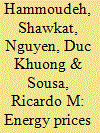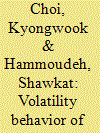|
|
|
Sort Order |
|
|
|
Items / Page
|
|
|
|
|
|
|
| Srl | Item |
| 1 |
ID:
132771


|
|
|
|
|
| Publication |
2014.
|
| Summary/Abstract |
We use a quantile regression framework to investigate the impact of changes in crude oil prices, natural gas prices, coal prices, and electricity prices on the distribution of the CO2 emission allowance prices in the United States. We find that: (i) an increase in the crude oil price generates a substantial drop in the carbon prices when the latter is very high; (ii) changes in the natural gas prices have a negative effect on the carbon prices when they are very low but have a positive effect when they are quite high; (iii) the impact of the changes in the electricity prices on the carbon prices can be positive in the right tail of the distribution; and (iv) the coal prices exert a negative effect on the carbon prices.
|
|
|
|
|
|
|
|
|
|
|
|
|
|
|
|
| 2 |
ID:
097199


|
|
|
|
|
| Publication |
2010.
|
| Summary/Abstract |
This paper examines the impacts of world, country, and sector-specific variables on the stock return volatility of twenty-seven US sectors in the short- and long-run, accounting for the asymmetric shocks based on GARCH models. In the standard GARCH model the two world variables, oil and Morgan Stanley Capital Index (MSCI), have differing impacts on the US equity sector returns' volatility, with oil price dampening it while MSCI heightening it for most sectors. This result underlines the need for hedging more against world capital market risk relative to oil risk which is probably hedged by many sectors. The world and country factors' impacts are not as pervasive across the board, compared with the sector-specific impacts of the P/B ratio and trading volume which affect almost all sectors. Increases in the P/B ratio would reduce the aggregate volatility, while increases in the trading volume would heighten it for all sectors. Asymmetry of factor impacts on volatility is also found for most sectors. Most of the GARCH factor results are confirmed in the CGARCH model with the exception of the impact of interest rate on the short-lived transitory volatility. Finally, interesting econometric results on the inclusion or exclusion of trading volumes are discussed.
|
|
|
|
|
|
|
|
|
|
|
|
|
|
|
|
| 3 |
ID:
097339


|
|
|
|
|
| Publication |
2010.
|
| Summary/Abstract |
This study supplements previous regime-switching studies on WTI crude oil and finds two possible volatility regimes for the strategic commodity prices of Brent oil, WTI oil, copper, gold and silver, and the S&P 500 index, but with varying high-to-low volatility ratios. The dynamic conditional correlations (DCCs) indicate increasing correlations among all the commodities since the 2003 Iraq war but decreasing correlations with the S&P 500 index. The commodities also show different volatility persistence responses to financial and geopolitical crises, while the S&P 500 index responds to both financial and geopolitical crises. Implications are discussed.
|
|
|
|
|
|
|
|
|
|
|
|
|
|
|
|
| 4 |
ID:
092834


|
|
|
|
|
| Publication |
2009.
|
| Summary/Abstract |
We examine the long- and short-run transmissions of information between the world oil price, Turkish interest rate, Turkish lira-US dollar exchange rate, and domestic spot gold and silver price. We find that the world oil price has no predictive power of the precious metal prices, the interest rate or the exchange rate market in Turkey. The results also show that the Turkish spot precious metals, exchange rate and bond markets do not also provide information that would help improve the forecasts of world oil prices in the long run. The findings suggest that domestic gold is also considered a safe haven in Turkey during devaluation of the Turkish lira, as it is globally. It is interesting to note that there does not seem to be any significant influence of developments in the world oil markets on Turkish markets in the short run either. However, transitory positive initial impacts of innovations in oil prices on gold and silver markets are observed. The short-run price transmissions between the world oil market and the Turkish precious metal markets have implications for policy makers in emerging markets and both local and global investors in the precious metals market and the oil market.
|
|
|
|
|
|
|
|
|
|
|
|
|
|
|
|
|
|
|
|
|